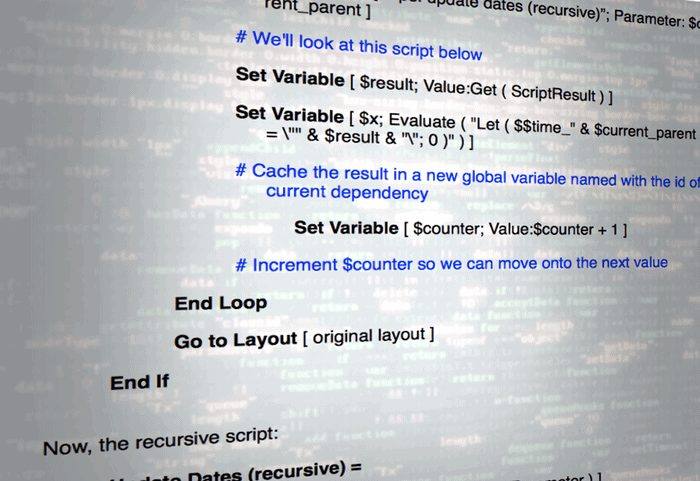FileMaker Pro Recursion PT 3
By Andy Persons:

*This article is part 2 of a 3 part series: part 1, part 2.
In my first post of this three part series, I posed a challenge: how do you update hundreds or thousands of tasks interconnected with tens of thousands of connections? In my second installment, we explored a possible solution: recursively looping through each task from the end-level tasks, tracing each one to its source, then returning back down the stack and updating the dates along the way.
However, one issue was still in the way. FileMaker recursion requires that each iteration maintain its “scope.” In this case, the current record and found set would have to be unique for each iteration. This would mean each iteration would have to open a new window; the proliferation of hundreds of windows would be excruciatingly slow and potentially would crash FileMaker.
In this final installment, we’ll explore an elegant solution that adds lightning-fast speed, avoids crashing FileMaker Pro and includes a free set of Ginsu knives if you read now*! *Ginsu knives not included, additional processing and handling charges may apply.
A Virtual Planetoid
The solution lies in caching (sometimes referred to as virtualizing). In general computing, caching refers to storing a duplicate of data in a more quickly accessible location. In FileMaker, caching usually refers to temporarily storing record data in global variables.
In our scenario, we’ll cache the dependency data (which tasks each task is dependent on) and the offset data (how long each task will take). This will allow us to do all our calculating without touching the database again until the very end. The benefits of this are twofold:
- We can maintain scope in each iteration because we will no longer be relying on the FileMaker found set. We’ll be able to use the script’s inherent scope, in essence maintaining our own “found set” by storing a list of record ids in local variables.
- Because we don’t touch the database engine until the very end, this approach is lightning fast. In my implementation, all tasks are updated within 1 to 2 seconds.
Download the article in its entirety as a PDF
*This article is provided for free and as-is, use and play at your own risk – but have fun! Excelisys does not not provide free support or assistance with any of the above. If you would like help or assistance, please consider retaining Excelisys’ FileMaker Pro consulting & development services.

![[FMP Tip-n-Trick] Integrating A.I. with FileMaker for Marketing Research](https://excelisys.com/wp-content/uploads/2025/08/ai-research-assistant-capture-500x383.png)
![[FMP Tip-n-Trick] FileMaker Pro Audit Trail “Refined”](https://excelisys.com/wp-content/uploads/2025/03/fmp-audit-trail-refined-500x383.webp)



Interesting recursion… go to FM tips-n-tricks, click on article and get the blog entry telling you to go to the tips page…rinse lather and repeat….. PDF?
Working on the fix – but it hopefully kept you busy. 😉
[…] *This is part 2 of a 3 part series: part 1, part 3. […]
[…] *This article is part 1 of a 3 part series: part 2, part 3. […]
Interesting technique. Thanks for sharing! The only thing I don’t get is why you have the meat of the articles buried in PDF files, instead of just being part of the blog posts.
The article was long and from an older blog set up – we just did not convert it.
One more question… I wonder about the impact of all those global variables. Wouldn’t having hundreds or thousands of global variables in memory have an impact on performance?
Or are you clearing those out after the import, and just didn’t show that part?
Thanks again!
Hi Shawn,
It didn’t have any impact in our testing. Since the variables contain only text, even thousands of them will only consume memory measured in 100s of KB.
Hi guys,
the links to the PDF documents seem to lead to a “File not found” page…
Can you fix it, please? (Or supply some other link to download them?)
Thanks a lot, for this and all other great tips and techniques shared!
Appreciate that you brought this to our attention. This has been addressed and fixed, please let me know if you eXperience any additional issues. Thanks you for stopping by our blog, enjoy!